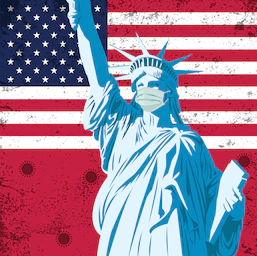
The federal emergency bill (CARES Act) that authorized $2 trillion for individuals, small businesses, health facilities, and large corporations affected by the coronavirus has a glaring omission. It excludes families that are undocumented and even those with mixed status.
Under the bill, immigrants considered “resident aliens” (which now can include DACA and TPS holders) are potentially eligible for the cash relief (depending on income levels) but not access to Medicaid. However, families that are undocumented or those with mixed-status (those with both legal status or US citizens and undocumented members) apparently will not have access to cash relief or Medicaid support for medical testing and health services.
Coronavirus does not distinguish by citizenship status. Everyone will be at risk if part of the population cannot avoid contagion or be treated if exposed. Immigration allies are circulating petitions challenging this provision as contrary to good public health practices and short-sighted. In addition to signing the petitions, individuals can urge elected officials to find alternative health services and propose follow-up emergency legislation that expands relief coverage to all people at risk in the US. The UU Service Committee’s website provides a listing of these and other steps.
Immigrants who are detained are at great risk of exposure to the coronavirus due to the close quarters and poor health conditions of detention centers. At least one immigrant has died of COVID-19. The UUSJ Immigration team along with its allies are calling on the federal government to release detainees who are only accused of crossing a border.
The risks are also extremely high for asylum-seekers forced to remain in Mexico in inhumane conditions of makeshift camps as they await the consideration of their cases, which are almost always rejected. Mexico does not appear to have taken public health actions to slow contagion in these areas. The US is ignoring its commitments under international law by forcing these families to wait in Mexico or move to a third country.
The emergency bill did not add funding for Immigration and Customs Enforcement (ICE) and Customs and Border Patrol (CBP) immigration enforcement. It added important provisions prohibiting the administration from transferring funds from the pandemic programs to activities like the border wall. While some parts of the administration said that ICE would restrict raids during the national emergency, there are reports of continuing raids. Allies like UUSJ and its faith partners are demanding that raids and deportations stop during this time.
Deferred Action for Childhood Arrival (DACA) holders, whose legal status is now being considered by the Supreme Court, are also concerned about possible deportation. United We Dream, representing DACA recipients, is pressuring elected officials to encourage the Supreme Court to delay taking action because a negative decision could be a pretext for immediate deportation. DACA young adults are often key contributors to the welfare of their families, both by their incomes and providing transportation for family members. United We Dream also notes that tens of thousands of DACA holders work in health care and are needed at this critical time. Petitions can be found at unitedwedreamaction.org.
Finally, many immigrants are very vulnerable economically. They often cannot afford to buy two weeks’ worth of groceries. Many work in hospitality and restaurant businesses that have been forced to close. The money that they normally send to families in their home countries of origin has plummeted, spreading economic hardship. They deserve access to cash relief whether or not they have an undocumented family member living with them.
Organizations like the American Civil Liberties Union (ACLU) and the Refugee and Immigration Center for Education and Legal Services (RAICES) are taking cases to court to protect immigrants and force their release from inhumane detention during the COVID-19 emergency. Both organizations need additional funding to pursue these legal cases. UUSJ will continue to highlight such needs.
By Charlotte Jones Carroll, UUSJ Board Secretary and convenor of UUSJ Immigration Task Group


